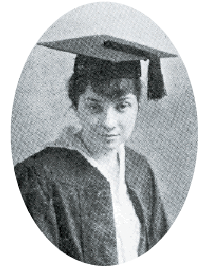
Hillsdale in 1915, gets an episode in PBS’s
“American Experience” series | Winona Yearbook.
Hillsdale alumna Elizebeth Smith Friedman’s life story came to the small screen this month when she was featured in an episode of the PBS documentary series “American Experience.”
The Jan. 11 episode, titled “The Codebreaker,” focused on the 1915 graduate’s groundbreaking contributions to the art and science of codebreaking, which she developed with her husband, William Friedman, during World War I. They continued to refine cryptanalysis throughout the 20th century by deciphering the codes used by organized crime syndicates during Prohibition and later by the Axis powers during World War II.
The episode is currently free to watch on the PBS website.
“She was somebody who had the ability to see beyond what most other people could,” said historian and author Amy Butler Greenfield in the episode. “She could see things start to unlock before her eyes.”
While at Hillsdale, Friedman studied Greek and English literature, was involved in the Pi Beta Phi sorority, and edited the literary section of The Collegian.
Friedman’s efforts ultimately helped save thousands of lives and secure the Allied victory in the Atlantic during WWII. Her story was largely unknown until 2008, when the records of her involvement in the war were declassified. The documentary is the latest to bring her contributions to light and is based on a 2017 book about her life, titled “The Woman Who Smashed Codes: A True Story of Love, Spies, and the Unlikely Heroine who Outwitted America’s Enemies” by journalist Jason Fagone.
“Codebreaking is about seeing patterns,” Fagone said in a 2017 interview with The Collegian, following the release of his book. “I think Elizebeth had some experience in finding patterns in lines of poetry in her literature background she got at Hillsdale. That served her well in codebreaking.”
While Hillsdale is not mentioned by the narrator of the “American Experience” episode, the college’s name is displayed on a pamphlet from the era that highlights that it was among the first to admit women. The following photo displays students from 1915 in front of Central Hall.
According to the documentary, Friedman fell into the field of cryptanalysis when she was a recent graduate and was offered a job by the eccentric textile tycoon George Fabyan. He wanted her to look for secret codes in Shakespeare’s plays that would prove that Francis Bacon was the real author. When the U.S. government needed codebreakers during WWI, it turned to both Friedmans for help. They became pioneers in the field and helped train others to decipher secret enemy messages.
Friedman continued to use her skills in service of the government during Prohibition, and helped bring down one of the largest rum-running operations in the country. Though the defense at the trial initially didn’t take her seriously due to her sex, she became a darling of the media after her expert witness led to conviction of several gangsters affiliated with Al Capone.
During World War II, she helped crack the complex Nazi code machine known as “Enigma.” She was so skilled that she was able to decipher codes in languages she didn’t speak, such as German, Japanese, and Chinese. Her efforts kept the American military informed of the locations of Nazi U-boats in the Atlantic and helped uncover covert Nazi operations in South America.
Despite her contributions to national security, Friedman wasn’t given much recognition during her life and died without fanfare in 1980. This was partially due to the classified nature of her work during WWII, but also because she was often denied credit for her accomplishments because she was a woman, according to the documentary.
Hillsdale College Professor of History Richard Gamble, who studies the philosophy of history, said that just because aspects of history may not be appreciated initially, historians can work to bring important stories to light. Though unfamiliar with Friedman’s story, he said the college should invest in documenting the lives of important alumni like her.
“Certainly this is the kind of graduate that Hillsdale ought to be very interested in documenting and tracking down,” Gamble said. “And maybe when things come up for sale, even to purchase items related to this graduate. We’ve done that for other leading figures in the college’s history.”
Friedman remained involved with Hillsdale throughout her life, appearing numerous times on lists of donors and commencement guests, according to the Alumni Magazine.
A profile on Freidman from the Feb. 1, 1936, edition of the Alumni Magazine summed up her success: “Mrs. Friedman runs her charming Chevy Chase home, her family, and her high-powered job with equal success. She does not forget Hillsdale where, as Elizebeth Smith, she starred in campus dramatics and in English. She writes, ‘I did so want to come back last June, but I couldn’t make it. I have had no let-up since my return from Spain in December, 1932. My regards to all who remember me.’”

